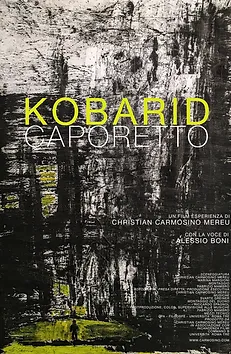
“Le parole con cui il film esprime i vari momenti della tragedia di Caporetto (e di tutte le guerre) sono profondamente commoventi. Colpisce anche il particolare linguaggio cinematografico, che usa l’immagine a volte come pausa riflessiva, a volte come contrappunto, lasciando però alla voce umana il compito di toccare a fondo anima e corpo”.
(Franco Piavoli, regista)
“The words the movie uses to expresses the different moments of the Kobarid (and all the wars) tragedy are profoundly moving. The particular cinematographic language is also striking, images are sometimes used as a reflective pause, sometimes as a counterpoint, but letting the human voice the task of deeply touching soul and body”.
(Franco Piavoli, film director)
Kobarid racconta la guerra, la disfatta, il fallimento delle politiche di potenza, il massacro dei soldati e dei civili e lo fa dando voce alle montagne, ai boschi, alle trincee, alla moltitudine di anonimi soldati che nella lotta per la sopravvivenza non perdono la loro umanità, anzi riscoprono, nella terra di nessuno tra la vita e la morte, il senso di fratellanza e la solidarietà che il delirio nazionalista e bellicista aveva spazzato via. Kobarid è la voce dei senza nome e dei senza voce, dei soldati semplici gettati di fronte alla quotidianità della morte. Kobarid è un inno alla vita, corale, tragico, poetico, in tempo di guerra. La voce di Kobarid è la voce delle tante guerre ancora in corso, è il fiume carsico che interrandosi resiste alla desertificazione della guerra, alla sua tabula rasa. La voce di Kobarid ci racconta che ogni nuovo inizio germoglia nella disfatta.
Kobarid tells the war, the defeat, the failure of power politics, the massacre of soldiers and civilians, and it does so by listening to the voice of the mountains, the forests, the trenches, to the multitude of anonymous soldiers who, in a battle for survival, never lose their humanity, but on the contrary rediscover, in the no man’s land between life and death, the sense of brotherhood that the warmongering Nazi delirium had swept away. Kobarid is the voice of the nameless and of the voiceless, of the simple soldiers left to face the everyday event of death. Kobarid is a hymn to life, coral, tragic, poetic, in a time of war. The voice of Kobarid is the voice of the many ongoing wars, it is the underground river that by disappearing resists the desertification of war, its tabula rasa. The voice of Kobarid tells us that every new beginning originates in defeat.
Festivals
2019 lug, Ischia Film Festival – Concorso Documentari
2019 mag, Roma3FilmFestival
2019 gen, Trieste Film Festival, Documentary Competition
“Ho visto il film Kobarid. Un’emozione inaspettata potente che ti impone di cercare dentro di te. Un film che senti sulla pelle e ti costringe a prendere contatto e a pensare”.
“I saw the film Kobarid. A powerful unexpected emotion that requires you to look inside. A movie that you feel on your skin and forces you to make contact and think."
Christian CARMOSINO MEREU
Alessio Boni
Anno di produzione / year of production: 2019
Durata / lenght : 100’
Paese / country : Italia
Formato di ripresa / shooting format: 4K, scope
Formato di proiezione / screening format: DCP
Ambientazione / location:
Kobarid (Caporetto) e Valle dell’Isonzo Slovenia
Prodotto da / produced by:
Christian CARMOSINO MEREU
Christian Carmosino Mereu
Marina Margioni
Fabrizio Mambro
Christian Carmosino Mereu
Svarte Greiner
Riccardo Spagnol
Postproduzione, color, supervisione alle musiche /
Postproduction, colour, soundtrack supervision:
Fabrizio Mambro
Giancarlo Savino
